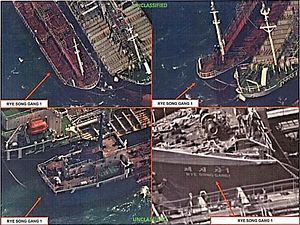This week, newly released Chinese customs data show that Beijing apparently exported no oil products to North Korea in the entire month of November. Taken at face value, this would imply that China is increasingly taking its sanctions implementations obligations more seriously and perhaps even going above-and-beyond requirements set in place by the four major United Nations Security Council resolutions passed this year sanctioning North Korea for its continued nuclear and ballistic missile testing. (The fourth of these, resolution 2397, is less than a week old, having been adopted just last Friday.)
Even beyond oil, according to Reuters, the new data show that China “also imported no iron ore, coal or lead from North Korea in November.” It also “did not export any gasoline, jet fuel, diesel or fuel oil to” North Korea. This is according to data released by the General Administration of Customs. Of course, it’s worth recalling that all of this excludes China’s exports of crude oil to North Korea, which have not been publicly disclosed for years now. Without clear data, many analysts anticipate that North Korea still receives a substantial amount of crude oil from China through pipelines. (Reuters, citing industry sources, estimates “520,000 tonnes, or 3.8 million barrels, of crude a year to North Korea via an aging pipeline.”)
The released November data is encouraging, but nonofficial Chinese sources are already challenging the narrative of China’s apparently much-improved sanctions enforcement. For example, the South Korean daily Chosun Ilbo reports that U.S. intelligence satellites have observed multiple China-flagged ships making deliveries of oil to North Korean vessels via ship-to-ship transfers approximately 30 times since October.
These transfers, where prohibited commodities are transferred between vessels at-sea, are generally difficult to track and used to bypass sanctions. Based on released satellite imagery, the U.S. Treasury Department has sanctioned six North Korean shipping companies for violating sanctions. (Ship-to-ship transfers are explicitly prohibited by UN Security Council resolution 2375, which was adopted in September following North Korea’s sixth nuclear test.) These kind of illegal activities will continue to undermine the desired effects of international sanctions against North Korea.
Even as new customs data show a remarkable cessation of the export of a range of prohibited commodities, China’s overall commodity trade with North Korea managed to increase in November. Moreover, according to NKPro’s ship tracker, a North Korean vessel may have been allowed to make a coal delivery at a Chinese port in November. Along with the smuggling activity noted above, all this suggests that the November data can’t be taken at face value for now. China has further to go in demonstrating its resolve to fully implement existing UN Security Council sanctions.

































